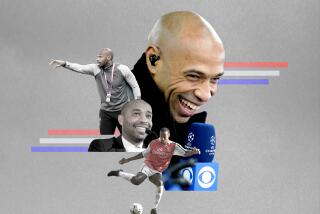Commentary : Dumping of Carpenter Was a Capital Offense
- Share via
WASHINGTON — How do nice people get themselves into such rotten spots? Why do bad things happen to good Capitals? How can David Poile, Bryan Murray and Bobby Carpenter -- who are about as civilized a general manager, coach and player as can be found in pro sports -- get into a brawl that makes them all look awful?
You want black eyes? We got black eyes at Capital Centre. Damaged reputations, spitting contests and controversy? They’re all on display.
When a team fires one of its highest-paid, most famous and popular players, that gets attention.
We’re not talking about a heart-to-heart talk or a bare-knuckles lecture or a last-resort benching or even a throw-up-your-hands trade. The Washington Capitals kicked Carpenter off the team last Tuesday as if he had a contagious disease. Take your $1.3 million contract and get out of our sight -- that’s what Poile’s radical decision, one that’s almost never seen in any pro sport, told the world.
By doing this, the slumping Capitals have chosen to leave themselves acutely shorthanded, largely for the sake of humiliating Carpenter -- making him both a scapegoat in the public’s eye and an object lesson to teammates. In the process, the Capitals have almost surely devalued Carpenter in the trade market.
What in the world did Carpenter do that was so bad that Poile would inflict both short- and long-term punishment to his team just so he could punch Carpenter in the mouth at high noon at center ice?
If Carpenter got decked Tuesday, then Poile has been getting pounded ever since. “You should see my phone bill,” he said.
Within minutes of the Capitals’ announcement that the team and player were parting company by “mutual agreement,” Carpenter denied it totally, in effect calling Poile a liar.
This bone of contention still makes the Capitals flinch. Murray claims that, at Monday’s practice, an assistant coach overheard Carpenter saying, over and over, “I’ve got to get out of this organization.”
“If I’d heard him say it, I’d have kicked him off the ice,” said Murray. “The next morning, his agent told David (Poile) that he’d be happy to move on, that ‘Bobby wants out.’ So, we made the decision that morning. You don’t want somebody who feels that way in your (locker) room. Several players already knew.
“Now, I can’t believe they’re denying it,” said Murray. “It’s making everything worse for everybody. If Bobby’d just said, ‘Yes, I want to be traded,’ or even if he’d said, ‘They’ve been terrible to me here,’ at least people would understand the situation.”
If it’s true that Carpenter said he wanted out, then Poile’s action, although still a tough and personal blow at the player, is not a below-the-belt punch.
First, let’s look at the situation from Poile’s and Murray’s point of view. The Capitals needed shaking up. Carpenter seemed lost in a Washington uniform; slowly, he may have been undermining Murray, an old-school coach who needs lots of authority to be effective. Murray already had bent over backward for Carpenter. “I had 56 meetings with him last year and 15 more this season,” said Murray. “We did for him things we didn’t do for others. That disturbed some players. ...
“This shows we are willing to do almost anything to get a commitment from our players that they want to be here and make a complete effort,” the coach said. “Actually, this has brought some of the guys together.”
Now, let’s look at it from Carpenter’s perspective. He was the all-time hot-shot, born-in-America hockey prospect at age 18. In four years, he turned the corner to stardom for one season, got big money, then suddenly lost his game. And maybe some of his desire, too. He stopped playing summer hockey, took college courses, got married, built a home. Hockey was not his whole life any more, yet his father and his agent still told him constantly that he was a potential superstar.
Carpenter became confused, worried, maybe even scared. “I’m playing brutal,” he’d tell mates one day. Then, the next, he’d have it in his head that the coach was to blame. Either he wasn’t getting enough playing time or his linemates weren’t good enough or he was upset at being moved to left wing.
So, and this is Carpenter’s tale, one day this week, Poile called him in and said, “What about a trade? Good for both of us?” Carpenter answered, “Sure, whatever you say.”
That’s not demanding to be traded. That’s just saying a deal is OK.
Imagine Carpenter’s shock when, hours later, he discovered he hadn’t been traded; he’d been sent into public exile -- maybe for weeks.
After such treatment, was Carpenter going to give the Capitals an easy out? Hell, no. He was going to say he wanted to stay in good old Washington and that he’d never asked to be traded. Hey, hadn’t he just built that new house? Let ‘em stew in their own juices.
So, who’s right and who’s wrong? Who’s the villain and who’s aggrieved? And what’s the final score?
Don’t we wish it were that easy.
Carpenter is hiding behind his all-America image and rounding off the edges of one central truth: he preferred a trade and let too many people know it.
Now, by playing angel, Carpenter is letting Poile and Murray, who depend on their own straight-arrow personas, take a public relations beating.
For their part, Poile and Murray are biting their tongues and taking their lumps. They can’t do worse to Carpenter than they’ve already done. To talk more freely, dish more dirt, would just show the degree to which they were furious at Carpenter’s immaturity and lack of effort. Sure, they wanted to show a floundering team that their anger was no trifling matter. It was time for the lash. But they don’t want to admit it in public. Not classy.
Will the Capitals get comparable value for Carpenter? And what if they can’t? If Carpenter took a pledge of allegiance, if he told the Capitals he loved them and wanted to stay, what then?
“Never close the door all the way,” said Poile. “We would certainly take that into consideration,” said Murray.
That would be a happy ending to a sad story. In the real world, where decent people try hard and sometimes still come up short, it seldom works that simply. Past a certain point, damage becomes irreparable and the rest is downhill.
More to Read
Go beyond the scoreboard
Get the latest on L.A.'s teams in the daily Sports Report newsletter.
You may occasionally receive promotional content from the Los Angeles Times.










